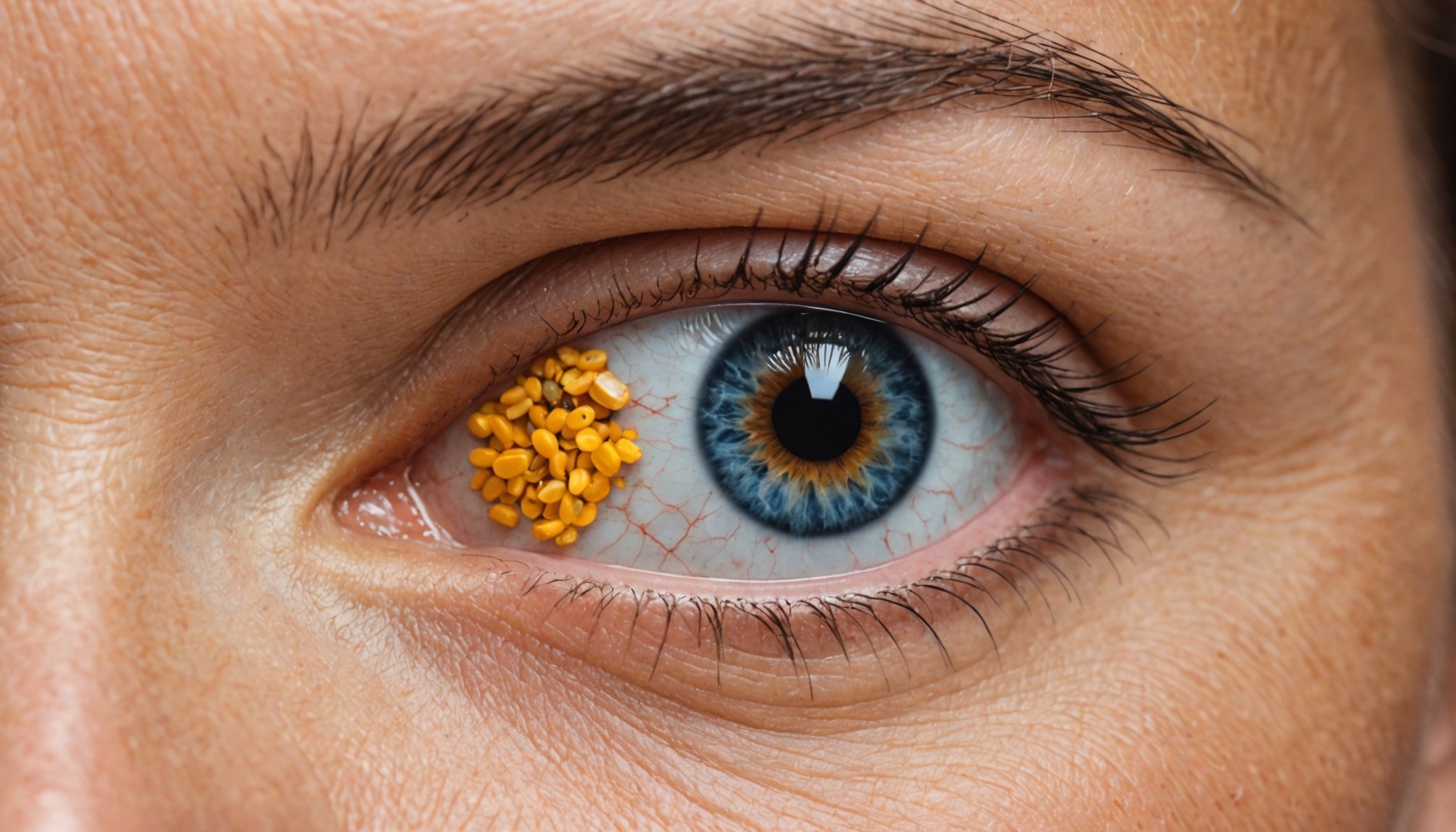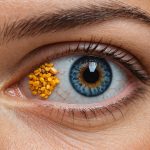Introduction to Eye Health and Aging
As we age, maintaining eye health becomes increasingly important. The natural aging process can lead to various vision issues that significantly impact quality of life. Common age-related problems include cataracts, age-related macular degeneration, and glaucoma. Each of these conditions can affect daily activities like reading, driving, and even recognizing faces.
One crucial way to support eye health is through diet, particularly the intake of vitamins. Vitamins such as A, C, and E, along with nutrients like lutein and zeaxanthin, play a critical role in maintaining healthy vision. Vitamin A is essential for low-light vision and overall eye health, while Vitamin C helps reduce the risk of cataracts. Vitamin E acts as an antioxidant, protecting eye cells from damage.
Have you seen this : Transform Your Plate: Effective Dietary Changes to Ease Polycystic Ovary Syndrome (PCOS) Symptoms
Age-related macular degeneration (AMD) is a condition where the central vision deteriorates, with vitamins being part of the solution to manage its effects. Lutein and zeaxanthin, found in green leafy vegetables, are carotenoids concentrated in the retina and can help delay the progression of AMD. By incorporating these vitamins into a balanced diet, individuals can help promote healthier eyes as they advance in age.
Essential Vitamins for Eye Health
Maintaining eye health requires a balanced intake of essential vitamins and nutrients. These nutrients play a crucial role in maintaining vision and preventing eye-related diseases.
Also to read : Unlocking Healing: The Transformative Power of Art Therapy for Substance Abuse Recovery
Vitamin A
Vitamin A is pivotal for good vision, as it supports the function of the retina. Consuming adequate amounts helps prevent night blindness and dryness. The recommended daily intake for Vitamin A varies with age and gender. Generally, adult males require about 900 micrograms and females need 700 micrograms daily. Rich food sources include liver, carrots, and green leafy vegetables. If diet alone is insufficient, supplementation may be considered. However, excessive intake can lead to toxicity, so it’s vital to consult a healthcare provider.
Vitamin C
Vitamin C is a powerful antioxidant that protects the eyes from damage caused by free radicals. An adequate intake may reduce the risk of cataracts and age-related macular degeneration. The daily recommended dosage is 90 milligrams for men and 75 milligrams for women. Citrus fruits, strawberries, and bell peppers are excellent sources. Supplements also provide an effective way to meet daily needs.
Vitamin E
Acting as another antioxidant, Vitamin E defends eye cells from oxidative stress. It’s associated with a decreased risk of cataracts. The recommended amount is 15 milligrams daily. You can obtain Vitamin E from nuts, seeds, and vegetable oils. Supplements can help maintain levels, but excessive amounts should be avoided to prevent adverse effects.
Additional Nutrients for Eye Health
When considering nutrients for eye health, it’s critical to focus on lutein and zeaxanthin. These antioxidants are naturally found in the eyes and play a crucial role in protecting against harmful light rays. They are also essential for maintaining the health of the macula, the part of the eye responsible for central vision.
Lutein and Zeaxanthin
Lutein and zeaxanthin are both vital for blocking blue light and preventing oxidative stress in the retina. The recommended daily intake for these nutrients varies, but experts suggest 6-10 mg per day can be beneficial. Leafy greens such as spinach and kale are excellent sources.
Omega-3 Fatty Acids
Omega-3 fatty acids, particularly DHA and EPA, contribute to overall eye health by supporting the cell membranes of the retina. Consuming 1000 mg daily is recommended. Fatty fish like salmon and mackerel are rich sources.
Zinc
Zinc aids in the transportation of vitamin A from the liver to the retina, empowering the production of melanin—a protective pigment in the eyes. Benefits include reducing the risk of age-related macular degeneration. A recommended intake of 11 mg daily for men and 8 mg for women can be found in foods like oysters and poultry.
Together, these nutrients contribute significantly to the maintenance and improvement of eye health.
Research-Backed Evidence of Nutrient Effectiveness
Understanding the connection between scientific research and eye health is crucial for informed decision-making about supplementing with vitamins. Numerous studies have linked various vitamins to significant eye health benefits, especially in reducing the risk of age-related vision conditions.
One substantial body of scientific research centres around the Age-Related Eye Disease Study (AREDS), which highlighted the positive impact of specific nutrients on eye health. According to AREDS, a formulation rich in vitamins C, E, beta-carotene, and zinc can slow the progression of age-related macular degeneration (AMD) in individuals already diagnosed with the condition.
Additionally, numerous case studies support these findings, demonstrating how a diet abundant in leafy greens, rich in vitamins, correlates with enhanced eye health benefits. For example, lutein and zeaxanthin, found in green vegetables like spinach and kale, are noted for their role in maintaining central vision.
Furthermore, emerging evidence underscores the influence of overall dietary patterns on eye health outcomes. Diets characterised by high consumption of fruits, vegetables, and omega-3 fatty acids have been consistently associated with a lower risk of developing certain age-related eye diseases.
This growing body of knowledge underscores the importance of a balanced intake of these key nutrients as a practical, evidence-based approach to supporting eye health.
Practical Tips for Incorporating Vitamins into Your Diet
Incorporating vitamins into your diet requires thoughtful dietary tips and a foundation of healthy eating practices. A well-rounded approach ensures optimum eye health alongside general wellness.
Creating a Balanced Diet
Achieving a balanced diet is key. Begin with meal planning ideas that highlight diverse nutrients. Incorporate whole grains, lean proteins, and healthy fats. Remember, a good mix supports eye health and fortifies the immune system.
Importance of Colorful Fruits and Vegetables
Including colorful fruits and vegetables significantly improves the variety in food choices. These foods provide essential vitamins like A, C, and E, which are crucial for maintaining eye health. A rainbow on your plate ensures a broad spectrum of nutrients.
Use of Supplements
While meals are the primary source of vitamins, sometimes the necessary nutrients might be lacking despite a varied diet. This is where vitamin supplements come into play. Supplements can be considered when specific nutrients needed for eye health, such as lutein or zeaxanthin, are insufficient in daily food intake. Consulting with a healthcare professional ensures the right balance and avoids excessive intake.
Monitoring Eye Health as You Age
As we journey through life, eye health monitoring becomes increasingly vital. Regular check-ups are the cornerstone of maintaining good vision and preventing potential issues down the line. These regular eye exams allow professionals to catch early signs of vision problems, which might otherwise go unnoticed. Early detection can make a significant difference, often preventing the progression of common age-related eye conditions.
Signs of potential vision issues can vary. Some may experience blurry vision or difficulty focusing, while others might notice increased sensitivity to light or frequent headaches. It’s crucial to remain vigilant for any changes in eyesight, no matter how trivial they may seem. This vigilance can guide decisions and prompt action, ensuring that your eye health remains a priority.
Proactively maintaining eye health extends beyond regular visits to an eye specialist. It can also involve adopting lifestyle changes, such as a balanced diet rich in vitamins essential for eyesight. Additionally, practicing good screen habits and wearing sunglasses to protect against UV rays are proactive steps. These measures not only benefit short-term eye health but also contribute to long-term vision preservation.
With regular eye health monitoring and proactive measures, individuals can effectively navigate the challenges that come with aging while preserving their vision.











